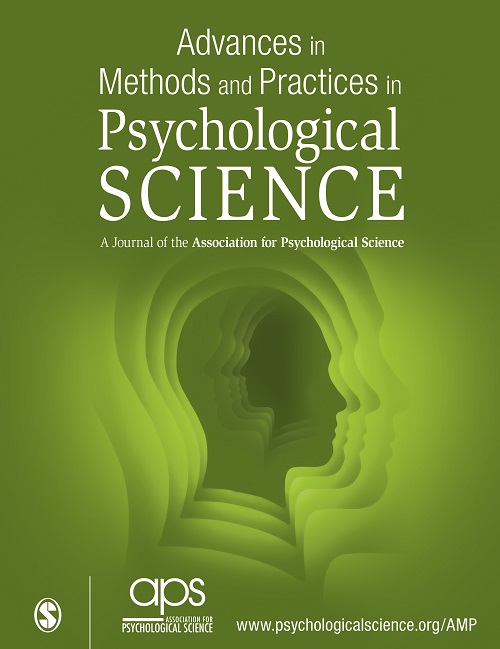Beyond the Mean: Can We Improve the Predictive Power of Psychometric Scales?
IF 13.4
1区 心理学
Q1 PSYCHOLOGY
Advances in Methods and Practices in Psychological Science
Pub Date : 2023-04-01
DOI:10.1177/25152459231177713
引用次数: 0
Abstract
Two participants completing a psychometric scale may leave wildly different responses yet attain the same mean score. Moreover, the mean score often does not represent the bulk of participants’ responses, which may be skewed, kurtotic, or bimodal. Even so, researchers in psychological science often aggregate item scores using an unweighted mean or a sum score, thereby neglecting a substantial amount of information. In the present contribution, we explore whether other summary statistics of a scale (e.g., the standard deviation, the median, or the kurtosis) can capture and leverage some of this neglected information to improve prediction of a broad range of outcome measures: life satisfaction, mental health, self-esteem, counterproductive work behavior, and social value orientation. Overall, across 32 psychometric scales and three data sets (total N = 8,376), we show that the mean is the strongest predictor of all five outcomes considered, with little to no additional variance explained by other summary statistics. These results provide justification for the current practice of relying on the mean score but hopefully inspire future research to explore the predictive power of other summary statistics for relevant outcomes. For this purpose, we provide a tutorial and example code for R.超越平均值:我们能提高心理量表的预测能力吗?
完成心理测量量表的两个参与者可能会留下截然不同的回答,但得到相同的平均得分。此外,平均得分往往不能代表大部分参与者的反应,这可能是偏斜的,峰度的,或双峰。即便如此,心理科学的研究人员经常使用未加权的平均值或总和得分来汇总项目得分,从而忽略了大量的信息。在目前的贡献中,我们探讨了量表的其他汇总统计(例如,标准差,中位数或峰度)是否可以捕获和利用这些被忽视的信息来改进对广泛结果测量的预测:生活满意度,心理健康,自尊,反生产行为和社会价值取向。总的来说,在32个心理测量量表和3个数据集(总N = 8376)中,我们表明平均值是所有考虑的五种结果的最强预测因子,其他汇总统计数据几乎没有解释额外的方差。这些结果为目前依赖平均分的做法提供了理由,但希望能启发未来的研究,以探索其他汇总统计对相关结果的预测能力。为此,我们提供了R的教程和示例代码。
本文章由计算机程序翻译,如有差异,请以英文原文为准。
求助全文
约1分钟内获得全文
求助全文
来源期刊
CiteScore
21.20
自引率
0.70%
发文量
16
期刊介绍:
In 2021, Advances in Methods and Practices in Psychological Science will undergo a transition to become an open access journal. This journal focuses on publishing innovative developments in research methods, practices, and conduct within the field of psychological science. It embraces a wide range of areas and topics and encourages the integration of methodological and analytical questions.
The aim of AMPPS is to bring the latest methodological advances to researchers from various disciplines, even those who are not methodological experts. Therefore, the journal seeks submissions that are accessible to readers with different research interests and that represent the diverse research trends within the field of psychological science.
The types of content that AMPPS welcomes include articles that communicate advancements in methods, practices, and metascience, as well as empirical scientific best practices. Additionally, tutorials, commentaries, and simulation studies on new techniques and research tools are encouraged. The journal also aims to publish papers that bring advances from specialized subfields to a broader audience. Lastly, AMPPS accepts Registered Replication Reports, which focus on replicating important findings from previously published studies.
Overall, the transition of Advances in Methods and Practices in Psychological Science to an open access journal aims to increase accessibility and promote the dissemination of new developments in research methods and practices within the field of psychological science.

 求助内容:
求助内容: 应助结果提醒方式:
应助结果提醒方式:


